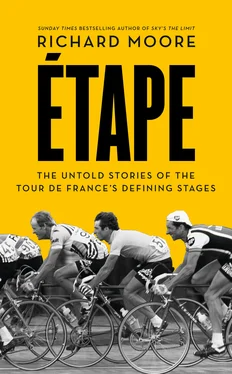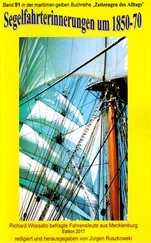‘If there is one rider I want to see at the Tour de France, it’s you,’ Mínguez told him. ‘For me,’ says Pelier, ‘that was huge. Your morale is really fragile when you do sport at this level.
‘You have doubts, of course. After coming out of the plaster and being able to move again, I spent the whole month of May doing rehabilitation. In June, I returned to racing. It was very, very difficult. But I knew Mínguez trusted me, and that helped a lot. It was only fifteen days before the start of the Tour that I began to get on track, to feel that I could reach my previous level.’
* * *
Still, on the road to Futuroscope, Pelier battled the wind and tried to remain focused on the task, crouched over his bike, grinding his way for kilometre after kilometre after kilometre, through largely featureless, flat countryside.
Then it began raining. The roads became greasy and wet, which helped Pelier – there was a big crash in the peloton, and they became cautious. With thirty-eight kilometres to go, Pelier led by eleven minutes. It was a big advantage – there was a full four kilometres between him and the peloton but it was tumbling from the maximum of twenty-five minutes. Pelier’s mind was a jumble of positive and negative thoughts, competing with each other: ‘I tell myself that I’m going to win, then I hear the gap is falling quickly and I think, it’s fucked, I’m going to be caught.’
As the gap began to fall, the sprinters’ teams could smell blood. Greg LeMond was in the yellow jersey and his team, ADR, had been first to take up the chase, reckoning that even a journeyman like Pelier shouldn’t be allowed so much time. Panasonic, the Dutch team, whose sprinter was Jean-Paul van Poppel, then got involved. ‘When the peloton started chasing I was consistently losing time, my lead was really falling,’ Pelier says. ‘But I had been trying to manage my effort. And when they started chasing, I accelerated. I knew I had to spare myself as much as possible, especially in that wind. I was economical with my effort all the time.
‘But the advantage you have, it’s the peloton who decide it. At 100km from the finish, it was feasible for them to catch me. A rider on his own can lose ten minutes in ten kilometres.’
The wind picked up. Pelier’s face was a picture of agony. ‘If Pelier does hit the wall, they’ll wipe him up very quickly indeed,’ said the TV commentator. He turned and hit crosswinds: treacherous in the peloton, but offering some relief to the lone rider. Then it was back into the teeth of the headwind, as torrential rain began to fall, spattering the lens of the TV camera. Through this distorted picture, the viewer could make out Pelier’s grim expression, which spoke of the torture of labouring for four and a half hours into the wind. ‘Pelier looks to be dying ten deaths,’ said the commentator.
With 10km to go, his lead had collapsed to five and a half minutes. Now there was a thunderstorm. ‘It gave me an advantage,’ Pelier says. ‘For one rider, it’s easier in those conditions; in the peloton it’s messy and becomes disorganised. It helped me. But at ten kilometres to go, I was still very worried. I knew they could still catch me.’
Inside the final three kilometres Pelier had entered the pleasure and business park that is Futuroscope. The roads were like a motor-racing circuit: wide and exposed to the full force of the wind. Pelier, as he had been for so much of his ride, was hunched over his bike, getting as low as possible, his upper body rocking as he forced a huge gear round. Earlier he had tried to keep the gears low, spinning his legs, saving his muscles. Now it was all about grunt rather than finesse. He got out of the saddle, searching for more power. Despite the greyness and rain, he kept his sunglasses on, and wore a white headband. A few bedraggled spectators stood at the side of the road, but only the hardy had bothered to come out and brave such atrocious conditions. Still Pelier could not be sure that he would hang on. ‘It was only when I was two kilometres from the finish that I knew I was going to win. I knew then that it was impossible for them to catch me.’
Inside the final kilometre, with barriers lining the road, the crowd didn’t thicken until the final 500 metres. The road rose to the finish and Pelier lifted himself once more out of the saddle. The clock ticked past six hours, 57 minutes. He had spent four and a half hours alone.
Behind Pelier as he approached the line, the official car, containing Hinault, flashed its headlights twice as though in celebration. And then, finally, Pelier sat up, at last able to straighten his back, and wearily lifted his arms. The peloton arrived a minute and a half later: they had been closing all the time.
Beyond the line, Pelier was intercepted by an army of Tour workers clad in Coca-Cola outfits, and behind them the photographers and reporters muscled in as the winner slumped over his handlebars, absolutely exhausted. ‘It was a bit suicidal,’ he managed to tell reporters, ‘because of the headwind. I think nobody behind me believed I could make it to the finish. They all thought they would see me again before the end of the stage.’
Then Pelier looked up, and stretched to see over the crowd. Word had reached him that his parents were there. But he refused to believe it until he saw them with his own eyes, and the TV cameras captured the moment when his face crumpled and tears began streaming down his cheeks. He raced towards them and as he neared his father, reached out, saying, ‘Mon père, mon père!’
It altered the narrative of the stage; surely, thought reporters, Pelier had been spurred on by the knowledge that his parents, Pierre and Janine, were at the finish. But Pelier had no idea. ‘No, absolutely not,’ he says now. ‘It was a total surprise. I didn’t know they had decided to come. To see them at the finish was a big surprise.
‘My dad had had the opportunity to see me at some races in my career, but my mum could never make it because she always cared for my brother, and stayed with him. But my brother was in a specialist centre for the holiday, and it fell during the Tour de France. My parents found themselves with a few days free and alone. It was the first time in six years my mum came to see me in a race. It was very emotional, very special.’
It was evident to all the world when he appeared on the podium and Pelier, jaw quivering and tears still streaming, accepted his prize, and his place in history, with the second longest solo breakaway in Tour history. 2
* * *
‘I was married, I had four children, and I was thinking of my future.’ Pelier is talking about his retirement, just over a year after Futuroscope, when he was still only twenty-eight. ‘I had an offer to join LeMond at Z, but in 1990 I had another accident. I fractured my knee in the Tour of Spain. I had to stop for a month and during that period I decided to retire. Having two serious accidents in two years influenced my decision. The career of a sportsman hangs by a thread. A rider is like a Kleenex. Once it’s been used, you throw it away.’
He was offered a job with the Regional Council of Franche-Comté, helping professional sportspeople manage the transition to ‘civilian’ life. ‘They wanted a sportsman to run this and they gave me a budget to put in place a programme that allowed top sportspeople to retrain and find a job after their career.’
Pelier’s own transition did not run smoothly for long. His wife, whom he described as ‘an extraordinary woman’, passed away. And after three years running a programme for ex-athletes, Pelier left to set up his own business, a bike shop. It didn’t work out, and now with five children to look after he struggled with financial problems. These days, he works part-time for the municipal council in the tiny village of Chaux-la-Lotière in Franche-Comté, western France. In this role, Pelier is a handyman who might be cleaning the streets, or clearing rubbish. It is not what he dreamed of, he has said, adding: ‘If it is not rewarding, it is not dishonorable.’
Читать дальше












